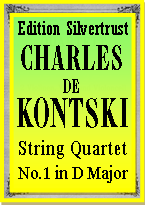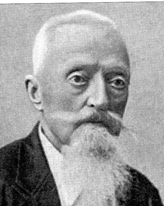Presents
Charles de Kontski
String Quartet No.1 in D Major
Information about the Polish composer Charles de Kontski (born Karol Katski) is relatively scarce and much of the information which exists is often contradictory. He was born into a musical family in the Polish city of Krakow probably in 1815 although some sources say 1813. His father Grzegorz was a then prominent composer and pianist. Of his four sons, only two, Antoine (Antoni) a virtuoso pianist and Apolonaire (Apolonairy) a violinist whom Paganini considered to be of the first oreder, achieved a measure of international fame during their lifetimes. Something that Charles (Karol) and his brother Stanislaw did not. After the unsuccessful Polish uprising of 1831, all four brothers emigrated to Paris and took the surname de Kontski as their professional name. Although some sources list Karol as a virtuoso pianist, this was possibly because they confused him with his brother Antoni. He was, in fact like his brothers, sent to the General Music School in Warsaw. There he studied studied violin with Jozef Bielawski, concertmaster of the Warsaw National Performing Orchestra. Subsequent to his studies, he and his brother Antoni toured together giving violin and piano concerts in Lublin, Lvov, Vilnius, Moscow and St Petersburg where the Tsar, upon hearing them play, awarded them generous stipendiums. After emigrating to Paris, Karol earned his living by composing and teaching. Eventually, his works came to the attention not only of French audiences but also of the leading musicians in Paris, including Achille Gouffe, the famous principal bassist of the Paris Opera Orchestra. Gouffe took part in the premiere performance of de Konskiís String Quintet for 2 Violins, Viola, Cello and Bass. Kontski's violin playing was of a very high standard, which allowed him to obtain a position the most prestigious orchestra in Paris, the Opera Comique. He died in Paris in 1867 at the age of 52
The Quartet in D major is dedicated to Jůzef Kasparek, originally from Lublin whom Katski probably met while touring in Poland. Kasparek like Katski had emmigrated to Paris after the unsuccessful 1831 Uprising. Although the quartet was published in 1862, it appears to have been composed a couple of decades earlier, perhaps around 1840 at which time Katski was an unknown and unable to get his works published. The first movement opens with a short, sorrowful Adagio introduction which leads to the main section, an upbeat and lively Allegro. The second movement, Andante quasi allegretto, is a kind of pastoral sounding Siciliano. Next comes a graceful Minuetto with an interesting dialog between the viola and cello. The nicely contrasting trio section is an Austrian Lšndler. The finale, Allegretto, is a showcase for Kontskiís superb compositional skills with its seamless changes of tempo and even a fugal section, as well as an exciting and rather operatic coda a la Rossini.
There are far and few Polish string quartets from the 19th century and this one, with its appealing melodies and excellent part-writing, is certainly a welcome addition to the repertoire.
Parts: $24.95

